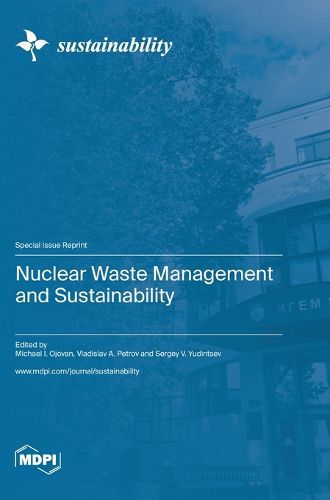Readings Newsletter
Become a Readings Member to make your shopping experience even easier.
Sign in or sign up for free!
You’re not far away from qualifying for FREE standard shipping within Australia
You’ve qualified for FREE standard shipping within Australia
The cart is loading…






This title is printed to order. This book may have been self-published. If so, we cannot guarantee the quality of the content. In the main most books will have gone through the editing process however some may not. We therefore suggest that you be aware of this before ordering this book. If in doubt check either the author or publisher’s details as we are unable to accept any returns unless they are faulty. Please contact us if you have any questions.
The effective management of nuclear waste is crucial to ensure the safe sustainable usage of nuclear energy in power generation, and numerous applications in medicine, industry, agriculture, and scientific research. Nuclear waste generated in these applications must be treated and conditioned for safe handling, transportation, storage, and ultimate disposal. Nuclear waste should be disposed of aiming for the permanent protection of hazardous radioactive materials from humans and the biosphere. Both processing and disposal activities of the waste encompass the utilisation of advanced technologies and materials aiming to ensure the reliability of the waste's long-term isolation. Cements, geopolymers, glasses, glass composite materials, ceramics, and metals are the materials analysed for expected performance in the envisaged disposal environment. Natural analogue systems and materials proven for their long-term stability and durability are investigated to ensure confidence in the multi-scale approaches currently used to predict the behaviour of waste disposal systems on geological timescales. This reprint provides analysis of nuclear waste management systems and activities being practiced aiming to provide a sustainable utilisation of nuclear energy. It is focused on the assessment of technological aspects of processing and disposal systems, materials performance in the storage facilities and disposal environment, and analysis of natural analogues to provide environmentally safe and sustainable employment and development of nuclear applications.
$9.00 standard shipping within Australia
FREE standard shipping within Australia for orders over $100.00
Express & International shipping calculated at checkout
This title is printed to order. This book may have been self-published. If so, we cannot guarantee the quality of the content. In the main most books will have gone through the editing process however some may not. We therefore suggest that you be aware of this before ordering this book. If in doubt check either the author or publisher’s details as we are unable to accept any returns unless they are faulty. Please contact us if you have any questions.
The effective management of nuclear waste is crucial to ensure the safe sustainable usage of nuclear energy in power generation, and numerous applications in medicine, industry, agriculture, and scientific research. Nuclear waste generated in these applications must be treated and conditioned for safe handling, transportation, storage, and ultimate disposal. Nuclear waste should be disposed of aiming for the permanent protection of hazardous radioactive materials from humans and the biosphere. Both processing and disposal activities of the waste encompass the utilisation of advanced technologies and materials aiming to ensure the reliability of the waste's long-term isolation. Cements, geopolymers, glasses, glass composite materials, ceramics, and metals are the materials analysed for expected performance in the envisaged disposal environment. Natural analogue systems and materials proven for their long-term stability and durability are investigated to ensure confidence in the multi-scale approaches currently used to predict the behaviour of waste disposal systems on geological timescales. This reprint provides analysis of nuclear waste management systems and activities being practiced aiming to provide a sustainable utilisation of nuclear energy. It is focused on the assessment of technological aspects of processing and disposal systems, materials performance in the storage facilities and disposal environment, and analysis of natural analogues to provide environmentally safe and sustainable employment and development of nuclear applications.